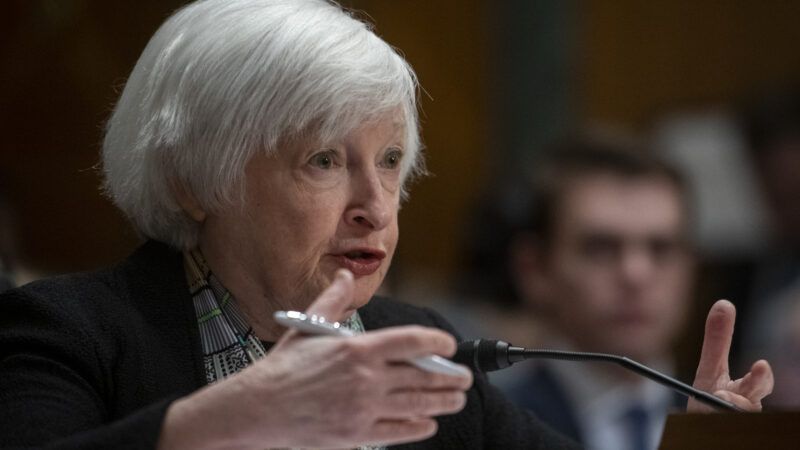The Clock Is Ticking: U.S. Could Default on Debt Payments by June 1
It's time for President Joe Biden and House Speaker Kevin McCarthy to strike a deal that will avoid a default and cut spending.

The clock is ticking down towards the first debt default in American history, which could occur as soon as June 1 if Congress and President Joe Biden fail to reach an agreement to raise or suspend the debt limit.
Treasury Secretary Janet Yellen wrote Monday in a letter to congressional leaders that her department "will be unable to continue to satisfy all of the government's obligations by early June, and potentially as early as June 1." It is impossible to know exactly when the Treasury will run out of authorized borrowing necessary to pay the federal government's bills, Yellen wrote, but that horizon is becoming more obvious as the days tick past. The Treasury has been operating under so-called "extraordinary measures"—effectively rooting around in the government's metaphorical couch cushions to turn up extra cash and borrowing authority in order to keep paying the bills—since January when it bumped up against a preliminary debt limit.
That was supposed to give President Joe Biden and congressional leaders a chance to negotiate an increase to the debt limit—also known as the debt ceiling, which is the maximum amount of money the Treasury is allowed to borrow to pay for budgeted spending. But Biden has squandered that extra time by refusing to negotiate with House Majority Leader Kevin McCarthy (R–Calif.). Last week, the Republican-controlled House passed a bill to raise the debt ceiling, cut federal spending back to 2022 levels, and cap future spending increases.
Yellen's letter might have helped thaw negotiations. On Monday evening, the White House announced that Biden had invited House and Senate leaders to the White House for a debt limit meeting on May 9.
Meanwhile, the Congressional Budget Office (CBO) updated its own projections on Monday for when the government will hit the debt limit. There is "a significantly greater risk that the Treasury will run out of funds in early June," CBO director Phillip L. Swagel said in a statement, due to lower-than-expected tax receipts during April. Previously, the CBO had expected the Treasury's extraordinary measures to be exhausted sometime between July and September.
"If the debt limit is not raised or suspended before the extraordinary measures are exhausted, the government will ultimately be unable to pay its obligations fully," Swagel said. "As a result, the government will have to delay making payments for some activities, default on its debt obligations, or both."
Contrary to how it might sound, raising the debt ceiling does not actually cause the federal government to incur higher levels of debt. Instead, it merely authorizes the Treasury Department to borrow the funds necessary to cover spending that's already been approved by Congress and the president. You can think of the debt ceiling as the limit on a credit card—a credit card that in this case has been maxed out. If you want to keep using that credit card, you'll need a higher limit. But refusing to raise the limit doesn't absolve you of the obligation to pay what's already been borrowed. It will only cause other problems when you try to purchase more stuff with the same card.
Obviously, the real problem in that scenario is that the person using the credit card is spending too much money. Raising or refusing to raise the limit won't fix that—only a better, smaller budget will get things under control. That's why debt limit fights have historically turned into battles over the trajectory of federal spending. All of the major deficit-reduction plans approved by Congress since 1985 have been attached to bills raising the debt ceiling.
It is therefore disingenuous for Democrats, including Biden, to argue that the debt ceiling must be lifted without other conditions. The fight over how to finance the federal government's addiction to borrowing is obviously tied up with the root cause of all that borrowing: overspending, year after year after year.
The federal government must avoid default at all costs, but raising the debt ceiling without a serious attempt at reducing future budget deficits will only accelerate the next iteration of this same crisis. The terms of the debate have been clear for quite a while. Now, the deadline is coming into focus, too.
